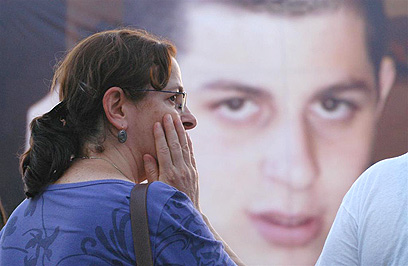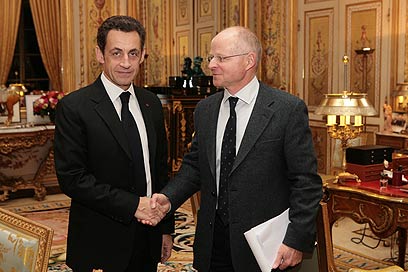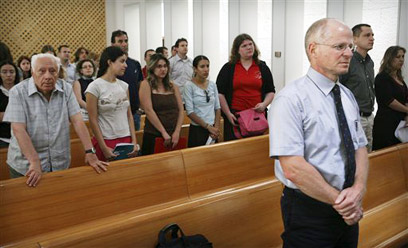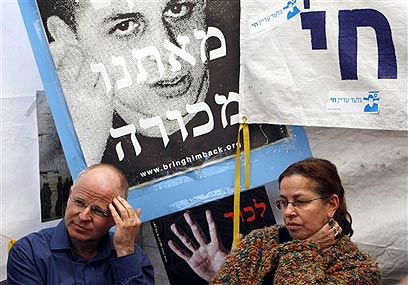
4 years on, still waiting for Gilad
Imminent deals foiled, empty promises from politicians, Hamas figures arrested and released as Shalit family waits for Gilad to return to Mitzpe Hila. From kidnapping at Kerem Shalom to march for soldier's release - dramatic moments in Shalit affair
Four years. 48 months. 1,461 days. 35,064 hours. Alone. This is the inconceivable amount of time Gilad Shalit has spent in Hamas captivity in Gaza. Four years of disappointment and turmoil for the Shalit family, and in the end, nothing has changed. Gliad Shalit, who should have completed his military service by now, is still being held by the Palestinian organization.
The painful affair broke on the morning of June 25, 2006, when a terrorist cell infiltrated Israel near Kerem Shalom. Lieutenant Hanan Barak of Arad and Staff Sergeant Pavel Slutzker of Dimona were killed in fire clashes. Gilad Shalit of Mitzpe Hila, a corporal in the IDF's Armor Corps, was kidnapped. Since then, his family has only received signs of life in the form of one video tape, another audio tape, and a handful of letters released by Hamas.
In the days that followed the kidnapping, the Shalit family's home in the Galilee was visited by many Israel Defense Forces officials and politicians. Then head of the IDF's Human Resources Directorate Elazar Stern told the Shalit family that Gliad was "kidnapped while on his feet". Then Vice Premier Shimon Peres put the blame on Khaled Mashaal, head of the Hamas politburo in Damascus, and Prime Minister Ehud Olmert phoned the family a day after the kidnapping to brief them on the fervent efforts via international channels to secure Gilad's release. The father, Noam Shalit, appealed to the kidnappers and the world via foreign networks, in hopes of receiving a sign of life from his son.
IDF force at site where Shalit was taken, 06.25.2006 (Photo: Amir Cohen)
After the abduction, the IDF launched Operation Summer Rain. At the time, Olmert said, "We will not occupy Gaza, we will not negotiate with the kidnappers." Several days later the Prime Minister's Office said, "There will be no ceasefire without the soldier's release." This operation, as those that were to follow, came to an end, without Gilad's return home. Parallel to the operation, several Hamas heads were arrested in the West Bank including Hamas Labor Minister Muhammad Barghouti, Minister of Jerusalem Affairs minister Khaled Abu Arafa, Muhammad Abu Tir, Muhammad Atwan, more. Abu Tir was just recently released from Israeli prison, without any progress made towards Gilad's release.
Almost immediately after the kidnapping, intensive talks for the soldier's release were held. Shalit's captors published a statement in which they demanded the release of 1,000 Palestinian prisoners in exchange for the soldier. Palestinian sources emphasized that, in addition, Israel must commit to halt all military activity against the Palestinians, which would lead to a long-term calm.
Several weeks after the kidnapping in the south, Ehud Goldwasser and Eldad Regev were captured by Hezbollah in the north, which led to the eruption of the Second Lebanon War. For 33 days, while still waiting for the first sign of life from their son, Gilad Shalit's family stayed in a bomb shelter in their home in the western Galilee.
Sings of life, hope for release
In September 2006, three months after the kidnapping, a first sign of life from Gilad was received. Israel confirmed that a letter was received from the captive soldier. In the middle of that same month, a Saudi newspaper reported that a prisoner exchange deal between Israel and Hamas was imminent. Ultimately, this report – like many others to follow – remained on paper alone.
Also in September 2006, a foreign official involved in the talks for Shalit's release said significant progress was being made in negotiations, and that the soldier would be home by the start of Ramadan that year. Egyptian Foreign Minister Ahmed Aboul Gheit was also optimistic about the outcome of the talks at the time, and said after a meeting with then Foreign Minister Tzipi Livni that Shalit would be released soon. There were also reports in Arab media that Shalit would be freed, and in exchange, exiled Hamas politburo chief Khaled Mashaal would be allowed to enter the Gaza Strip.
_wa.jpg)
Tel Aviv rally for soldiers' release, 08.31.2006 (Photo: Yaron Brener)
In December 2006, Hamas Prime Minister Ismail Haniyeh joined the optimistic voices and said Shalit's release was near. "The matter of the Palestinian prisoners will be resolved soon. They will be released, and in return, the Israeli soldier will be freed." Palestinian President Mahmoud Abbas said Shalit would be freed with the formation of the Palestinian unity government. When this government was formed at the start of 2007, Noam Shalit was left wondering where his son was. Abbas and the Palestinian information minister planted further seeds of hope when they promised yet again in April 2007 that Gilad was on his way home.
But two months later, everything changed – Hamas led a violent takeover of the Gaza Strip, expelled and killed Fatah men, and painted Gaza green. Egyptian President Hosni Mubarak remained optimistic, and told Yedioth Ahronoth newspaper at the time that Shalit would be released once the situation in the Strip calmed down.
In June 2007, exactly one year since the kidnapping, an audio tape with Gilad's voice was released:
"I, the soldier Gilad, son of Noam Shalit, am being held by the mujahideen. Mother and father, my sister and brother, friends in the Israel Defense Forces: I send you regards from jail and my longing for all of you. An entire year has passed with me in jail, and the state of my health is still deteriorating and I need extensive hospitalization.
"I am sorry for the lack of interest in my case and in the demands of Khattab al-Qassam on the part of the Israeli government and the army. It is clear that they must accede to these demands in order for me to be released from jail - especially as I was involved in a military operation, under orders, and was not a drug dealer. Just as I have parents, a mother and a father, the thousands of Palestinian detainees also have mothers and fathers who must have their sons returned. I have great faith that my government will take more of an interest in me and will accede to the demands of the mujahideen. Corporal Gilad Shalit."

Gilad's mother, Aviva Shalit (Photo: Yaron Brener)
On the day the tape was released Gilad's father told Ynet, "I hope this is a sign from Hamas in order to restart negotiations."
Released without Gilad
In February 2008, a second letter from Gilad Shalit was received. The third was received four months later. The note, in his handwriting, was passed on to his parents as part of Hamas' commitment to former US President Jimmy Carter who had visited the region at that time. The message: "I beg you to release me." A long time before the letters and video were received, Hamas had allowed glasses to be brought to the abducted soldier.
In October of that year, Gilad received greetings from home. A letter from his family, brought by French President Nicolas Sarkozy was given to Hamas politburo chief Khaled Mashaal during Sarkozy's visit to Damascus. Noam Shalit said he had been given confirmation that his son had received the letter.
The Shalit family, who restrained themselves for many months, also fought. Family members went abroad to garner support. Noam Shalit met a number of times with Sarkozy who promised to assist, partly because Gilad also has French citizenship.
In June 2008, just before the agreement to tone down hostilities was signed, Gilad's family submitted a petition to the High Court against the agreement. They said the opening of the border crossings, part of the agreement, was a violation of the government's commitment and contrary to the decision of the Committee for Security Affairs, and was extremely implausible. The court rejected the petition, and the agreement, to last half a year, was applied.

Noam Shalit with Sarkozy in 2009 (Photo: Courtesy of Elysee Palace)
On July 22 of the same year, Gilad's friends were discharged – three years after they signed up for the Armored Corps. They then marched to the Defense Ministry in Tel Aviv where they met the defense minister. Ehud Barak said, "As the past and present IDF commander, I consider it a moral duty to do all that can be done to bring Shalit home."
Deal almost achieved
The most prominent IDF action since the abduction was Operation Cast Lead, which began at the end of December 2008. The soldiers who entered the Gaza Strip said they would not leave without Gilad, but the operation ended with Gilad still in captivity. During the fighting, reports were received that he had been wounded but they were denied by Israel. His family said it was the last chance to liberate him. After this, the cabinet decided to make every agreement with Hamas dependent on a prisoner-exchange deal which included Gilad.
The family then set up a protest tent in front of the Prime Minister's Residence in Jerusalem towards the end of Olmert's term of office after Gilad had been held for almost 1,000 days. Ministers, MKs, public figures and ordinary citizens came to the tent to support the family. Yuval Arad, daughter of kidnapped pilot Ron Arad, also visited. Yoel, Gilad's elder brother who had stayed out of the spotlights till then, joined the struggle. Even before they came to the capital the family launched a new campaign including sending letters, emails and SMS messages with the text "Save me" as Gilad had written in his letters.
As the 1,000th day approached, it seemed that a deal would be reached. Ofer Dekel, the prime minister's special envoy on prisoner exchange, and Shin Bet chief Yuval Diskin headed the negotiations with Hamas via the Egyptian mediator. But again hopes were dashed. Olmert said Hamas had toughened its position and violated agreements which were formed during the previous year, and brought up extreme demands. Hamas for its part said Israel had got cold feet.

Noam Shalit in court against lull, June 2008 (Photo: AP)
Noam Shalit wrote to Olmert after the contacts were halted. "You are responsible for maintaining the alliance between the IDF and the State, and the family," he wrote. "We demand unequivocally, despite the price – bring Gilad back."
Israel released some of the names of prisoners it was not willing to release. The prime minister held a special press conference and explained, "We have our limits, and we will not go beyond them. The government of Israel which I head will not yield to the dictates of terror."
Year four: Still no sign of Gilad
The passing year, the fourth for Shalit's captivity, has been characterized by repeated glimmers of hope. Late 2009 saw many reports on the imminence of a deal to release the captive soldier in exchange for the release of some 1,000 Hamas prisoners and mediated by Germany. The forum of seven ministers convened for a series of discussions in order to decide whether to accept the deal.
As part of the public debate regarding the price for Shalit's release, families of terrorism victims voiced their own feelings on the matter. The families have a hard time coming to terms with the possibility that murderers of their loved ones will walk free.

Noam and Aviva Shalit in protest tent (Photo: AP)
The mood of optimism was helped by a videotape forwarded by Hamas to Israel showing Shalit alive and relatively well for the first time since his abduction. He related the events of a day spent with his family and noted, "I hope the government won't miss the chance to strike a deal."
Despite some progress, negotiations reached a standstill over issues such as the release of top terrorists such as Marwan Barghouti and Ahmed Saadat and the deportation of "heavy" prisoners. Both sides exchanged blames and accused each other of hindering the deal. This week Prime Minister Benjamin Netanyahu admitted for the first time that he had agreed in the past to release 1,000 prisoners in exchange for Shalit. Hamas never responded to the proposal.
The campaign for the captive soldier's release has received little media attention in the last months despite efforts by campaign activists to keep the matter on the public agenda. A weekly protest watch outside the prime minister's residence has been set up. Meanwhile, high-profile prisoners such as Muhammad Abu Tir and Aziz Duwaik, who were arrested following Shalit's abduction, were released from Israeli prisons.
This week it appears the Shalit family has reached the end of its tether and leveled harsh criticism at Israel's leadership. On Sunday, the family will begin a march to Jerusalem together with thousands of activists and other sympathizers, from which they do not intend to return until Gilad is released.
Gilad Shalit was kidnapped into the Gaza Strip exactly four years ago on Friday











